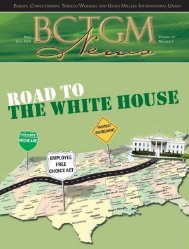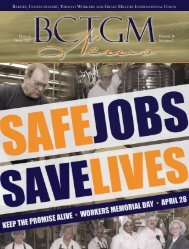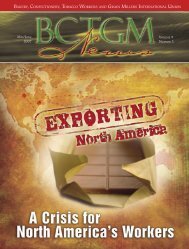to view/print. - Bakery, Confectionery, Tobacco Workers and Grain ...
to view/print. - Bakery, Confectionery, Tobacco Workers and Grain ...
to view/print. - Bakery, Confectionery, Tobacco Workers and Grain ...
You also want an ePaper? Increase the reach of your titles
YUMPU automatically turns print PDFs into web optimized ePapers that Google loves.
BCTGM Fights<br />
for Food Safety<br />
During the last year, food safety<br />
has become one of the leading<br />
domestic policy issues <strong>to</strong> face<br />
North America. Imports of<br />
processed food have doubled in<br />
the last decade. Food processing<br />
plants in the U.S. <strong>and</strong> Canada are<br />
being shuttered, as production<br />
is moved <strong>to</strong> developing nations.<br />
Ingredients coming from countries<br />
with little or no regula<strong>to</strong>ry<br />
oversight are found in most of our<br />
processed foods. The government<br />
agencies responsible for keeping<br />
the U.S. food supply chain safe<br />
are overwhelmed. Massive recalls,<br />
of both imported <strong>and</strong> domestic<br />
food has shattered the public’s<br />
confidence. As a result, 76 million<br />
Americans are sickened each year<br />
by food borne illnesses.<br />
Under this shadow, the<br />
BCTGM began an ambitious<br />
legislative <strong>and</strong> educational<br />
campaign that was directed by the<br />
BCTGM International President’s<br />
Office, <strong>and</strong> included collaboration<br />
with the AFL-CIO <strong>and</strong> food-related<br />
non-profit organizations. According<br />
<strong>to</strong> BCTGM International President<br />
Frank Hurt, it was time <strong>to</strong> take a<br />
st<strong>and</strong>. “We could not just sit back<br />
<strong>and</strong> watch the government turn a<br />
blind eye <strong>to</strong> tainted food imports,<br />
or <strong>to</strong> shoddy manufacturing<br />
processes here at home,” said Hurt.<br />
Food Imports Rise Dramatically<br />
According <strong>to</strong> government data,<br />
in the past 10 years there has<br />
been a significant increase in the<br />
amount of processed food that is<br />
imported in<strong>to</strong> the United States<br />
(See chart). The increase is in both<br />
processed food, as well as ingredients<br />
that are used during manufacturing<br />
in U.S. or Canadian plants.<br />
Why the dramatic rise? One<br />
troubling reason is that it has<br />
become common practice for food<br />
processing companies <strong>to</strong> close<br />
down operations in Canada or the<br />
United States, move production<br />
<strong>to</strong> developing nations, <strong>and</strong> import<br />
processed goods back in<strong>to</strong> North<br />
America. For example, Hershey<br />
recently announced a massive<br />
restructuring plan that will<br />
eliminate more than 3,000 North<br />
American jobs at a half-dozen<br />
plants <strong>and</strong> move production <strong>to</strong><br />
Mexico, where it has an existing<br />
plant. The new plant will produce<br />
for the North American market.<br />
Other food companies have done<br />
the same. Nabisco produces Fig<br />
New<strong>to</strong>ns in Mexico. Sherwood<br />
Br<strong>and</strong>s makes c<strong>and</strong>y canes in<br />
$16.6<br />
billion<br />
$31.8<br />
billion<br />
Food Imports<br />
1997 2006<br />
Argentina. A large portion of the<br />
his<strong>to</strong>ric Chicago c<strong>and</strong>y industry<br />
has moved out of the country.<br />
FDA Overwhelmed<br />
The dramatic rise in imported<br />
foods has put a tremendous strain<br />
on the agencies that are supposed<br />
<strong>to</strong> protect the food system. Currently,<br />
the Food <strong>and</strong> Drug Administration<br />
(FDA) only inspects one<br />
percent of the food that comes in<strong>to</strong><br />
the U.S. In addition, the FDA is<br />
under-funded, under-staffed, <strong>and</strong><br />
has little authority <strong>to</strong> control the<br />
flow of food in<strong>to</strong> the country. In<br />
testimony before the U.S. House of<br />
Representatives, William Hubbard,<br />
former FDA Associate Commissioner,<br />
<strong>to</strong>ld Congress that “the<br />
FDA’s import screening process<br />
was designed for an earlier era.”<br />
Highlighting the problem’s at<br />
In 1997, the value of processed<br />
food shipments coming in<strong>to</strong><br />
the U.S. was $16.6 billion. By<br />
2006, it had risen <strong>to</strong> $31.8<br />
billion. These figures do not<br />
include beef, chicken <strong>and</strong> other<br />
agricultural products like grain<br />
<strong>and</strong> corn.<br />
8 BCTGM News
















